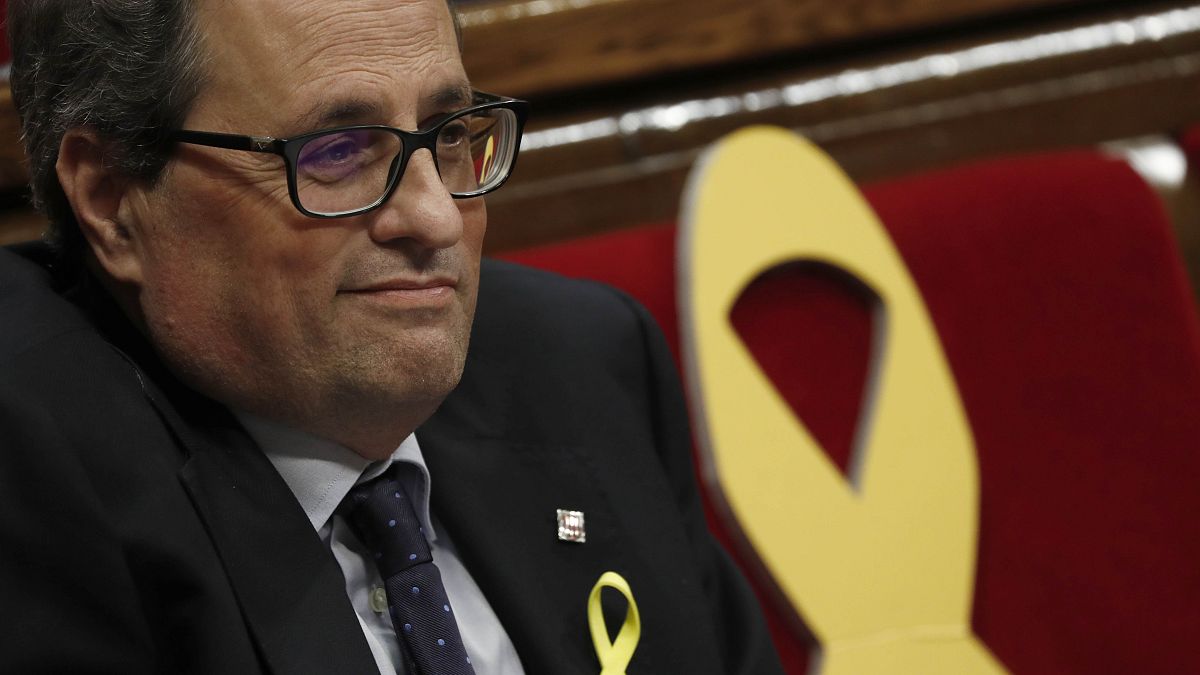Catalonia’s new leader elected by the region’s parliament is described as a hardline separatist who has vowed to continue the struggle for independence from Spain.
Quim Torra is something of an unknown quantity, even in Catalonia. Relatively new to politics, the 55-year-old was handpicked as the candidate by Carles Puigdemont.
Part of the former Catalan leader’s Together for Catalonia (JxCat) coalition, Torra reportedly only sees his new position as temporary. He has pledged allegiance to his predecessor, vowing to reinstate him as Catalonia’s “legitimate president”.
Puigdemont is in self-imposed exile in Germany where a court is to decide on his extradition to Spain, where he is wanted on charges of rebellion.
The new chief heads to Berlin on Tuesday, in the words of El Pais “to render obedience” to Puigdemont — who in turn is described as a “ventriloquist” in an opinion piece in the same paper. Spain’s opposition Cuidadanos party has called Torra a “puppet” of his master.
The implication of such comments is clear: The pair are tied at the hip and any departure from the confrontational stance of the former Catalan president is highly unlikely.
No let-up for independence
Once the new Catalan cabinet is in place, the Madrid government is expected to end direct rule in the region, imposed under Article 155 of the Spanish constitution in the wake of the October vote, illegal under the Spanish constitution.
However, the political establishment in Madrid is on its guard. The authorities have warned they could intervene if Catalonia defies the law again.
Conservative Prime Minister Mariano Rajoy — who says he didn't like what he heard during the Catalan parliamentary debate — is meeting opposition parties and has offered to hold talks with the new Catalan leader. Madrid will “judge actions, not words,” he has said.
The question is, will Torra act within the bounds of the Spanish constitution — or seek to make unilateral moves for independence similar to those of his predecessor?
Following his election by the Catalan parliament, the new leader immediately signalled he would continue the drive to break away from Spain.
“We will be faithful to the October mandate,” Torra said, referring to the referendum, “to build an independent state in the form of a republic”.
He has also promised to create a “state council in exile” and vowed to establish a constituent assembly to write the constitution for a new Catalan republic.
Anti-Spanish comments
“Everybody will win rights with the republic,” he said before being elected. “Nobody will lose rights. The republic is for everybody, no matter what they vote.”
Such talk of inclusion, however, is met with scepticism by critics who argue that Torra has a history of xenophobic, anti-Spanish rhetoric.
Torra, a lawyer and publisher who previously worked for an international insurance company, entered politics by joining the grassroots separatist group Omnium Cultural. Its leader Jordi Cuixart is in pre-trial detention, one of 25 Catalan figures facing charges relating to last year’s referendum.
Originally set up by Catalan businessmen to counter persecution during the Franco era, Omnium played an instrumental role in pushing for independence in the run-up to the vote.
The movement is steeped in Catalan history and identity, about which Torra has written several books. Some of his comments on social media have appeared to be openly hostile to Spain and the Spanish.
“We have been occupied by the Spaniards since 1714,” read one tweet. “Spaniards only know how to plunder,” said another.
An article he wrote, published in 2012, said Catalonia was “the last colony in Europe”. It referred to a book of fables for children where animals talk. Torra went on to describe Spaniards he accused of rejecting Catalan culture as "beasts in human form", full of hatred.
Conciliation or conflict
Torra has apologised for his past comments on social media, but his every move will be under scrutiny.
The new Catalan leader is under pressure from Rajoy’s government, but also from hardline separatists who suspect he may adopt a stance too conciliatory to Madrid.
Catalonia remains deeply divided politically. Torra was voted in by the narrowest of margins, and then only when members from the radical secessionist CUP party abstained.
However, at the fourth attempt since last December’s elections, the region has a new leader. Unlike most others, Torra faces no charges before Spanish courts. Amid the recent gridlock in Catalan politics, that is arguably a sign of progress.
